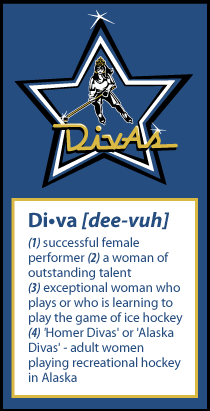Secrets of coaching adult women’s hockey
I don’t have all the answers, but I hope there is enough here to get you heading in the right direction so you can help to improve your program.
Positive, positive, positive.
Always keep it positive. There is nothing in it for a rec adult player to get anything but positive feedback. Encourage and support. Let your love for the game get you through the times you want to say, “half of you should just quit!”
We have all seen someone get so frustrated with a situation that they walk away. I usually feel this way when dealing with banks or insurance companies or bureaucracies. Frustration, tension and anxiety are performance killers. You need to offer encouragement wherever you see something noteworthy. Keep it upbeat, because if your new players get over the hump they are going to have fun.
I’m a firm believer that positive feedback is almost always the right feedback. Wait for the one example of where you see it done right to comment – rather than the five examples of where it is done wrong.
Becoming a good coach means helping your players to learn how to practice.
Secret to coaching: A coach teaches a player how to play the game. A good coach makes players excited about learning the game. A great coach teaches players how to practice so the player can get herself to the highest level she is able/willing to be at.
When you create a positive learning environment in your practices, your team will constantly want to improve.
Tell your players It is more exciting to be strong and competent. You will have more fun. Making plays in practice gives you confidence to make them in a game.
Get your team on the path to skill development.
You can offer dumb repetition and condescending instruction, or you can light the fire of personal skill development regardless of your players’ ability and watch it grow.
Invite questions.
Having your team ask questions is one aspect of the feedback loop. I love questions from the Divas. It gives me an idea about where they are and what they are thinking. Once a question is asked we are engaged, and I get a chance to craft my response to it, and hopefully demonstrate it on ice or visually on the white board.
“I thought we were supposed to head man the puck? Now you are saying we pass too much in the neutral zone.” Well I’m seeing a lot of low percentage passes on the offensive blue line. Passes side to side on the offensive blue line aren’t successful. I’d rather see you carry the puck when you can, enter the offensive zone, then make your play.”
Communication is more than a message.
You need to check in and ascertain how what you are saying is heard and whether it is accepted.This happens for hockey concepts and things in general. During a scrimmage I told one of the Divas who was especially quick, fiery and aggressive that night, “You’ve got some pepper tonight, good job”. Later I was told she proudly announced in the locker room. “Did you hear coach say I had a pepper in my pants?” This goes for hockey concepts too.
Focus on the benefits the coaching will provide. Don’t focus on the coaching.
If you try to understand your players then you won’t be patronizing or condescending or talking to the wall. Tailor your message to the receiver. It’s not for the sender. For a new player “getting it in deep” might not mean anything until you give examples. “If you dump the puck in, and it doesn’t make the defenseman turn around to get the puck behind her it is not getting it in deep. It is a just pass to the other team.” Then affirm, “When in doubt get it in deep. Put the puck in behind their net. Make their defensemen turn around to get the puck.” What makes sense to you might sound like Finnish to them. This is why I try anecdotes, funny demonstrations, etc with the Divas. We talk about the G-spot of power skating.
Compliment the progress.
Maybe not there yet, but compliment the progress. Every couple of weeks when I see new players struggling or making progress with a new skill I bring the team to center ice and say: “My hats off to you learning a new skill as an adult!” The Divas clap their sticks in a show of support and off we go to work on something else.
The more your players are involved the more committed they become.
Think of ways to foster involvement in the program and in hockey in general. We have put on pond hockey tournaments, co-ed tournaments, and jamborees. We meet after games to recount all the great plays, get together to watch the Olympic hockey games, and have pools for the NHL playoffs.
Focus on no more than three things.
Ask yourself before every practice what the three skills/concepts that are most important right now to your team and work on them first and foremost. Then add one new thing later. Skating, shooting and passing are the general skill categories. Defensive zone coverage, neutral zone play, offensive zone play, offensive zone entry, break outs, forechecking, backchecking are all concepts that need to be introduced or taught, but it all comes back to skating, passing and shooting. At a different level I’d say that really understanding hockey as a game of transition is the key to the game, but you may not get beyond working on edge control, passing and shooting for years.
It seems daunting. You must be patient. Your love for the game will be your guiding star. Just remember when teaching individual skills to set up practices so your players get quality repetitions right on the edge of their abilities. Seek to improve accuracy, skill and power. Comfort is a killer of improvement. When they find something easy and your drill looks perfect you need to challenge them. You are asking them to struggle a little, to push themselves, and perhaps to fall down. This is borderline unpleasant. You see it working and know it works but you don’t actually know why. That is a bit of a mystery.
Be yourself.
Does personality or leadership style matter? Coach your personality. Don’t try to be Herb Brooks if you are really a commercial fisherman, because it won’t be believable. Use your own style and deliver your ideas for the program. Make sure you get feedback on how it is working and adapt.
Praise a lot during feedback.
During games, scrimmages, practices give lots of immediate feedback and praise. Divas are eager to learn. They are receptive. They need consistent positive feedback to learn the game. When I see a good play I will point it out for those who are on the bench to hear, then I will reaffirm again when that line comes off the ice. As a new player’s love for the game grows she might also enjoy watching NHL or college games, and they are delighted when they hear the same message from the announcer that they heard from you about getting pucks to the net or regrouping in the neutral zone.
Ask your team what they want to work on.
This happens after a series of games or a tournament. “Ok you all just played and we all have a feeling after playing like I wish I was better at….fill in the blank.” I ask them to give me some ideas what those skills are, and we will work on some of them. The Divas tell me they want to know how to attack one on one, how to stick handle thru a player like the experienced women from Anchorage do, or how to move a defenseman side to side. Great, now I have some guidance and we can get to work on it.
Facilitate ‘aha’ moments.
Try to give clear consistent information. Also try to describe things occasionally in original ways. This may lead to those “aha” moments. It doesn’t have to be complicated. Players have had Aha moments when I described backward swizzle skating as “wiggle, wiggle, wiggle.”


